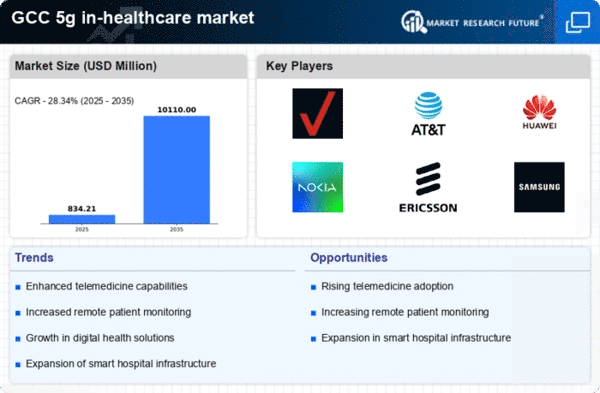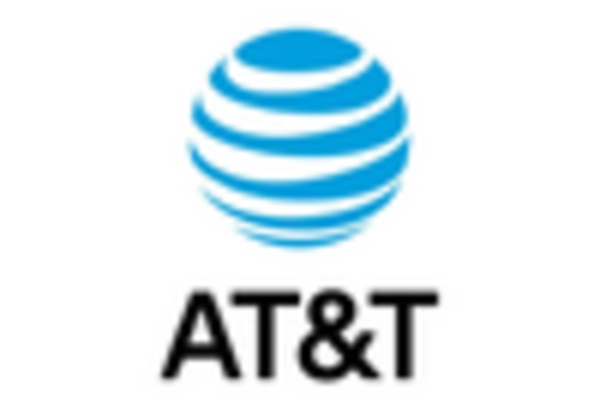Enhanced Data Security and Privacy
As the 5g in-healthcare market expands, the importance of data security and privacy becomes increasingly critical. The rapid transmission of sensitive health information necessitates robust security measures to protect patient data from breaches. In the GCC, regulatory frameworks are evolving to address these concerns, with an emphasis on compliance and data protection. The implementation of advanced encryption methods and secure communication protocols is likely to enhance trust among patients and healthcare providers. This focus on security may lead to increased investments in cybersecurity solutions, which are projected to reach $1 billion in the GCC by 2026. Consequently, the emphasis on data security is expected to drive the adoption of 5g technologies in healthcare settings.
Government Initiatives and Funding
Government initiatives play a pivotal role in the growth of the 5g in-healthcare market. In the GCC, various governments are investing heavily in digital health infrastructure to improve healthcare delivery. For instance, initiatives aimed at enhancing telehealth services and smart hospital projects are gaining traction. The GCC governments have allocated approximately $2 billion towards digital health transformation by 2027. This funding is likely to support the deployment of 5g networks, which are essential for enabling advanced healthcare applications. As a result, the collaboration between public and private sectors is expected to foster innovation and accelerate the integration of 5g technology in healthcare.
Growing Focus on Personalized Medicine
Personalized medicine is emerging as a key driver in the 5g in-healthcare market. The ability to tailor treatments based on individual patient data is becoming increasingly feasible with advancements in genomics and data analytics. 5g technology facilitates the rapid exchange of large datasets, enabling healthcare providers to develop personalized treatment plans more effectively. In the GCC, the personalized medicine market is projected to grow at a CAGR of 20% through 2030. This growth is indicative of a shift towards more patient-centric care models, where treatments are customized to meet the unique needs of each patient. The integration of 5g technology is likely to enhance the capabilities of healthcare providers in delivering personalized care.
Rising Adoption of Artificial Intelligence
The integration of artificial intelligence (AI) in healthcare is significantly influencing the 5g in-healthcare market. AI applications, such as predictive analytics and diagnostic tools, require high-speed data transmission and low latency, which 5g technology can provide. In the GCC, the AI healthcare market is anticipated to reach $1.5 billion by 2028, driven by the need for improved patient outcomes and operational efficiency. The synergy between AI and 5g technology is likely to enhance clinical decision-making and streamline workflows. As healthcare providers increasingly adopt AI solutions, the demand for 5g connectivity is expected to rise, further propelling the growth of the market.
Increased Demand for Remote Patient Monitoring
The 5g in-healthcare market is experiencing a surge in demand for remote patient monitoring solutions. This trend is driven by the need for continuous health tracking, particularly for chronic disease management. With 5g technology, healthcare providers can offer real-time monitoring, which enhances patient outcomes and reduces hospital visits. In the GCC region, the market for remote monitoring devices is projected to grow at a CAGR of 25% from 2025 to 2030. This growth is indicative of a broader shift towards proactive healthcare management, where patients can receive timely interventions based on real-time data. The integration of 5g technology facilitates seamless communication between devices and healthcare providers, thereby improving the efficiency of care delivery.
















